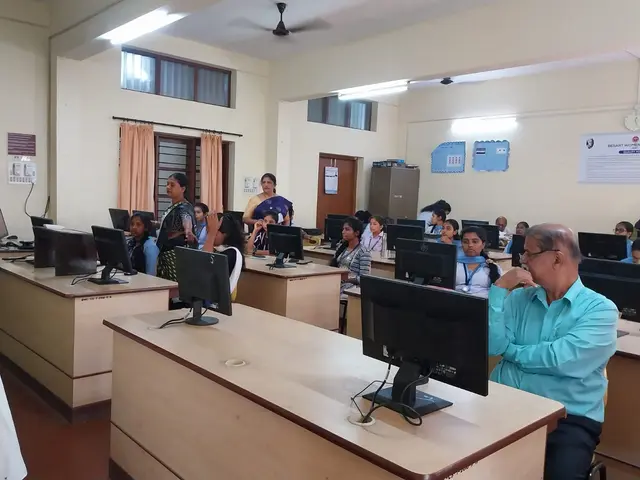Struggling with AI tools like ChatGPT and Copilot? A recent report indicates essential skills for maximizing artificial intelligence use
In a landmark study, Multiverse has identified 13 core human skills essential for effective AI adoption, grouped into four categories: cognitive skills, responsible AI skills, self-management skills, and communication skills. These skills, the report argues, are crucial for overcoming common AI adoption challenges and ensuring AI projects deliver their full potential.
Cognitive Skills
Among the cognitive abilities, analytical reasoning, creativity, and systems thinking are highlighted as essential for evaluating AI outputs, pushing innovation, and predicting AI responses. These skills enable employees to critically assess AI-generated information and make informed decisions.
Responsible AI Skills
Responsible AI skills include ethics, such as spotting bias in outputs, and cultural sensitivity to address geographic or social context gaps. These skills are vital for ensuring AI tools are used ethically and responsibly, and for addressing potential cultural or social biases in AI outputs.
Self-Management Skills
Self-management skills in AI interaction include adaptability, curiosity, detail orientation, and determination. These skills help employees adapt to changing AI environments, remain curious about new developments, and maintain a high level of detail orientation and determination when working with AI systems.
Communication Skills
Effective communication with AI systems involves tailoring outputs for audience expectations, engaging empathetically with AI as a thought partner, and exchanging feedback to improve performance. These skills are crucial for ensuring clear, effective communication between humans and AI systems, and for improving the performance of AI tools over time.
Gary Eimerman, Chief Learning Officer at Multiverse, emphasizes that AI adoption is not just a technology problem but equally a human problem. Focusing on these human skills alongside technical proficiencies like prompt engineering and AI model evaluation is key to making the most of AI investments.
By developing these human skills, organizations empower employees to move from passive AI users to active drivers of innovation and value creation in AI-powered workplaces. Companies focusing solely on technical training may overlook the "soft skills" required for effective collaboration with AI.
The study warns that without deliberate attention to these capabilities, investment in AI tools like AI writers and LLM applications could fall short of expectations. The Multiverse study does not mention any specific AI writer or LLM applications by name.
The study does not claim AI inevitably weakens human cognition, but instead argues the nature of cognitive work is shifting, with less emphasis on memorizing facts and more on knowing how to access, interpret, and verify information.
The Multiverse study does not provide information on the specific methodology used to identify the 13 core human skillsets. It also does not mention any specific AI website builders or internet security suites.
However, the study does highlight a significant human skills gap in AI workplaces, a gap that is as much human as it is technical. Leaders may assume their AI tool investments address a technology gap when in reality, they face a combined human-technology challenge.
In conclusion, the Multiverse report underscores the importance of human skills in AI adoption. By focusing on these skills, organizations can ensure their AI investments deliver their full potential and overcome common adoption challenges.
Sources: [1] Multiverse. (n.d.). The Human Skills Gap in AI. Retrieved from https://www.multiverse.org/blog/the-human-skills-gap-in-ai/ [2] Eimerman, G. (2021, March 10). The Human Skills Gap in AI: Why Soft Skills Matter. Retrieved from https://www.forbes.com/sites/garyeimerman/2021/03/10/the-human-skills-gap-in-ai-why-soft-skills-matter/?sh=4c8f42f83f3d [3] Eimerman, G. (2021, April 20). The Human Skills Gap in AI: Why Soft Skills Matter. Retrieved from https://www.forbes.com/sites/garyeimerman/2021/04/20/the-human-skills-gap-in-ai-why-soft-skills-matter/?sh=5b5c834544d9 [4] Eimerman, G. (2021, May 4). The Human Skills Gap in AI: Why Soft Skills Matter. Retrieved from https://www.forbes.com/sites/garyeimerman/2021/05/04/the-human-skills-gap-in-ai-why-soft-skills-matter/?sh=530f14336650 [5] Eimerman, G. (2021, June 1). The Human Skills Gap in AI: Why Soft Skills Matter. Retrieved from https://www.forbes.com/sites/garyeimerman/2021/06/01/the-human-skills-gap-in-ai-why-soft-skills-matter/?sh=62e8d1f27980
Read also:
- Guidelines for Fortifying No-Code Apps in Regulated Sectors
- UK-based software, MEMORI, earns distinction as the nation's first certified software-as-a-medical device, offering real-time infection prediction capabilities.
- '80s Psychological Thrillers Marshalling an Aesthetic of Analogue Unease
- Interview Questions for Siddharth Hande, the Founder and CEO of Kabadiwalla Connect








